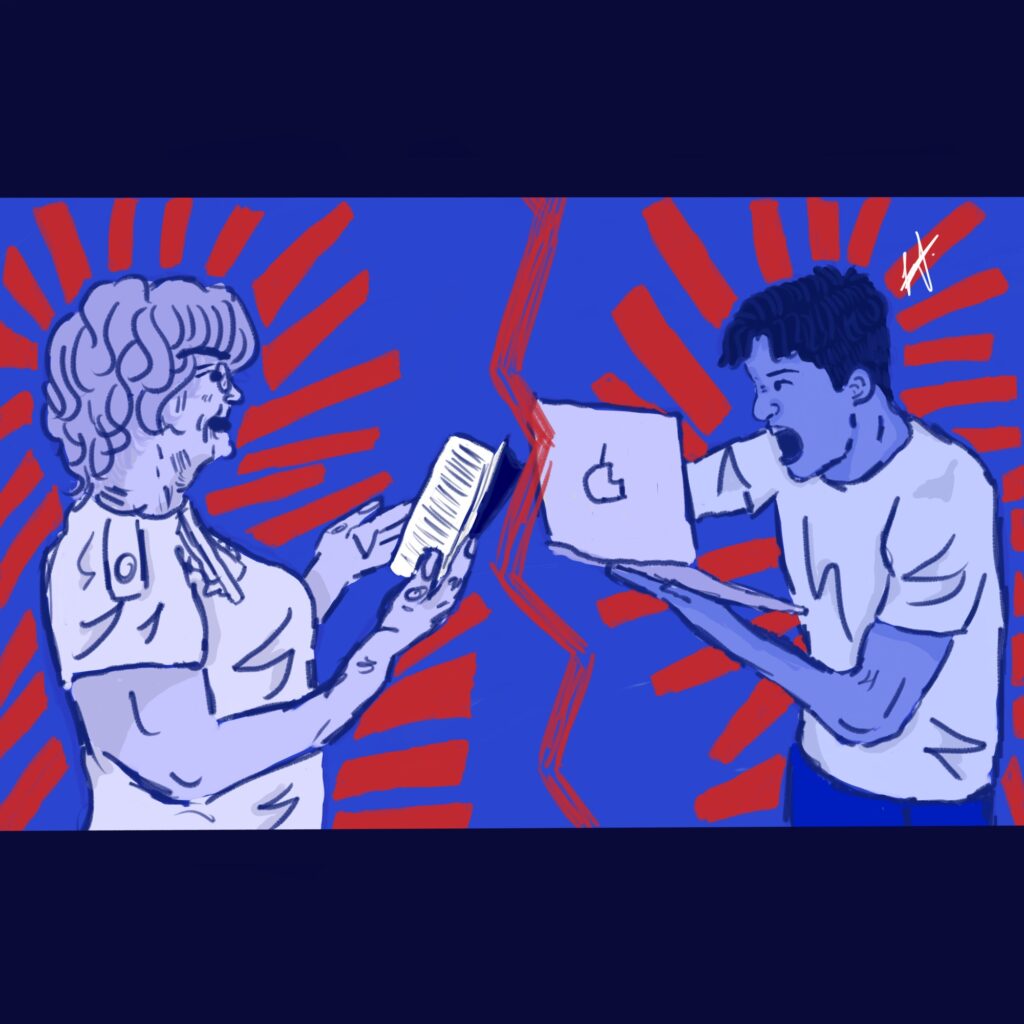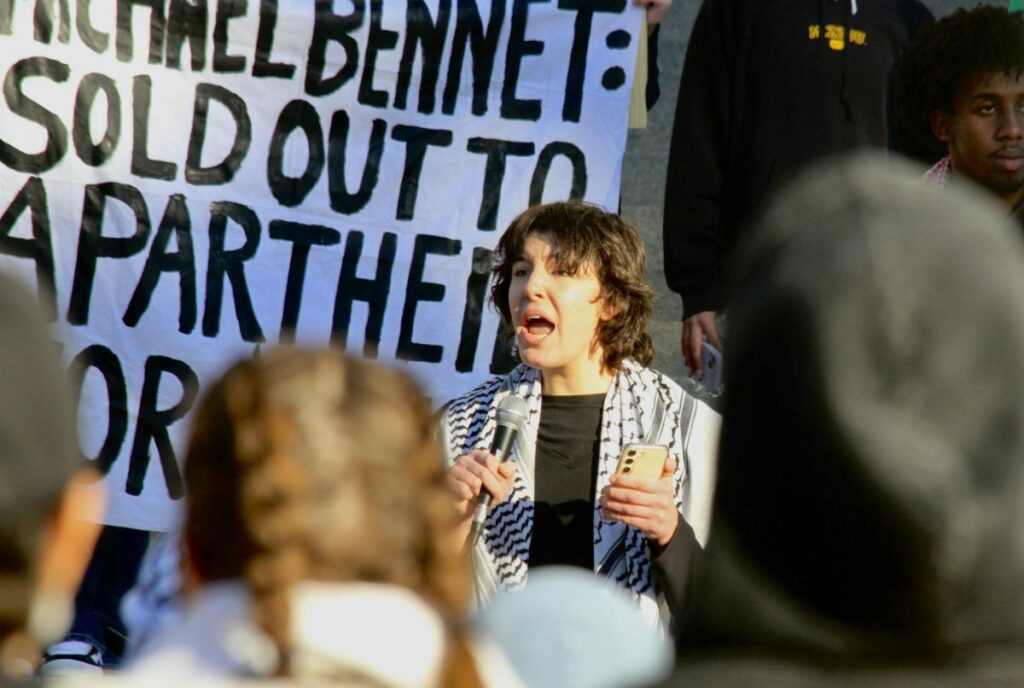This story is syndicated from The Union St. Journal, the newspaper of Cherry Creek High School in Greenwood Village, CO. The original version of the story ran here.
Senior Ben Ginsberg-Margo, an Israeli-American, has lost two cousins in the Israel-Hamas War, one soldier and one reservist of the Israel Defense Forces (IDF). He remembered learning about the Hamas attacks through a missile alert app called Tzofar on Oct. 7, when the Palestinian Hamas terrorist group struck Israel.

“Basically every single place in Israel was hit,” Ginsberg-Margo said. “I had no idea what was going on.”
Israel formally declared a state of war the next morning. The fighting has been ongoing since. 1,139 Israelis and 30,365 Palestinians (as of Feb. 28) over the course of the war have died.
Sophomore Camila Parsons, whose name has been changed for her safety, is a Muslim Libyan, who has been adjacent to the Israel-Palestine conflict her whole life. “I’m not in the fire but I’m standing right next to it,” Parsons said.

Young people have been at the forefront of this war, and they have primarily sided with Palestine. A January poll from YouGov showed a large difference between age groups. 30% percent of 18-19 year olds said they sympathized more with Palestine, compared with only 13% of those 45 and older who feel the same. But 47% over total respondents said they were about equal, or they weren’t sure.
Those young advocates have brought the political fight back to the U.S., with protests at the Denver Capitol being frequent since the attack. One movement, “Shut It Down for Palestine,” has organized many of these.
“We’re watching a genocide be committed…all with American funding,” Denver School of the Arts senior Skye said at a Nov. 9 “Shut it Down For Palestine” rally. “As an American citizen, I can’t stay silent.” Protesters like her are told by organizers to not give away full names or personal information.
Skye was one of the first speakers at the protest. She led chants and legislators for supporting Israel. Gen-Z, high school-age Americans like her, are one side of a sharp ideological divide between ages in the US. Young people at Creek, like Parsons, have visited similar protests since the war began.
Senior Isaac O’Connor, whose name has been changed for his safety, said that the conflict at the high school level makes it difficult for him to speak out for Israel. Parsons said the same, but from her pro-Palestine perspective.
O’Connor, Ginsberg-Margo, and Parsons all agreed on one thing: social media was the driving factor in the disconnect between generations.
“Social media has allowed things to be shared almost at the blink of an eye,” O’Connor said. “People can share their opinions a lot more openly…they can create Facebook groups, they can create Instagram reel saying ‘free Palestine’ or ‘free Israel.’”
Junior Ayushi Sah has advocated, often using Instagram. “The things that are going on in Palestine are just horrendous,” Sah said. “The number of Palestinians displaced since October 7 are increasing day by day.”
O’Connor believes that adults support Israel more for the opposite reason: they know more about the history of the conflict. “They understood what was going on in 1948, when Israel was established by all these nations [for Holocaust survivors],” he said.
Sah agreed, but also believed the significant gap was due to the fundamental educational ideas of older generations. “Their history books have been sugar coated,” she said. “Whereas today’s generation has social media, they have more access to other people’s opinions.”
For Gen-X and older millennials, Parsons argued, the 9/11 attacks were a major contributing factor to widespread stereotypes about the Middle East.
“[9/11] changed their idea of all Muslims,” Parsons said. “They had that stigma towards all of the Middle Eastern and North African states too.”
Not only have Gen-Z primarily sympathized with Palestine throughout the war, protests for Israel are also in decline in favor of more common Palestinian protests.
Rallies and marches like the “Shut It Down for Palestine” were not as common in the days directly after the attack, but they have increased in popularity since, according to data from Crowd Counting Consortium. Meanwhile, pro-Israel protests have severely declined in the months after Oct. 7.
An AP poll also revealed that comparing late Jan. to early Nov., about half of American adults believe that Israel has gone too far in their response, percentages seen for the first time since Oct. 7.
Ginsberg-Margo says many opinions are uninformed in the age of Instagram and TikTok. “They say, ‘we’re defending ourselves against terrorists that justifies everything that we do,’ or ‘we’ve been oppressed for a long time that justifies anything that we do,’” he said. “I don’t think the majority of people on either side have a nuanced opinion.”
For the minority of Gen-Z that supports Israel, Ginsberg-Margo said it’s difficult to support all of the IDF’s actions. “There aren’t good sides to war,” he said. “I’m not going to defend everything that the Israeli government does, but I do think that what is happening right now in Gaza is a direct effect of Hamas.”
As far as Sah is concerned, this conflict is utterly one-sided, and that’s why young people should advocate against Israeli attack. “People are losing their families in this and it’s just horrifying to see so many people displaced,” she said. “They don’t have the potential to fight back. So it’s clearly not war.”
The Wire says that the war approaches a deadlock, since neither side has reached their goals. Israel has not destroyed Hamas or freed the hostages in Gaza. Hamas has not succeeded in replacing Israel with a Muslim Palestinian state.
But O’Connor and Sah both believe, despite any territorial or ideological disputes, peace is of utmost importance.
“Both sides are killing. There’s not really a right and wrong, there’s really not a good or evil,” O’Connor said. “If there’s fire, it’s going to be fought with fire. If there’s peace, it’ll be met with peace.”
According to Al Jazeera, pro-Palestine social media is being censored by some media networks, and pro-Israel endorsement is taking a downturn in popularity. Despite Gen-Z’s efforts, even with heavy waves of online advocacy, support for either side of the war might not be working to full success.



